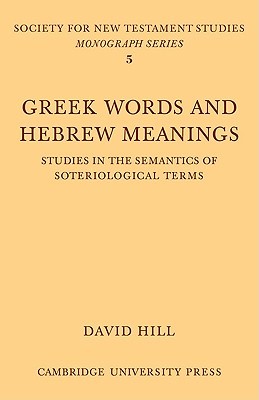
- We will send in 10–14 business days.
- Author: Hill
- Publisher: Cambridge University Press
- ISBN-10: 0521108861
- ISBN-13: 9780521108867
- Format: 14 x 21.6 x 2 cm, minkšti viršeliai
- Language: English
- SAVE -10% with code: EXTRA
Reviews
Description
This contribution to the interpretation of New Testament terms consists of detailed semantic studies of five important groups of words which are essential to Biblical theology. The author's purpose is to ascertain the meaning with which certain important words were used by the writers of the New Testament documents. Such studies, he believes, must precede any attempt to write Biblical theology. The terms studied are the Greek words for 'propitiation', 'ransom', 'righteousness', 'eternal life' and 'spirit'. In each case Dr Hill examines the use and meaning of these words in Classical Greek, in the Septuagint, in Philo and in the inter-testamental literature, as well as the corresponding Hebrew words in the Old Testament, the Dead Sea Scrolls and Rabbinic literature. All this background study is then brought to bear on the interpretation of these terms in the New Testament. The studies confirm the indebtedness of New Testament theological terms to the Old Testament and in particular to the language of the Septuagint.
EXTRA 10 % discount with code: EXTRA
The promotion ends in 23d.13:11:28
The discount code is valid when purchasing from 10 €. Discounts do not stack.
- Author: Hill
- Publisher: Cambridge University Press
- ISBN-10: 0521108861
- ISBN-13: 9780521108867
- Format: 14 x 21.6 x 2 cm, minkšti viršeliai
- Language: English English
This contribution to the interpretation of New Testament terms consists of detailed semantic studies of five important groups of words which are essential to Biblical theology. The author's purpose is to ascertain the meaning with which certain important words were used by the writers of the New Testament documents. Such studies, he believes, must precede any attempt to write Biblical theology. The terms studied are the Greek words for 'propitiation', 'ransom', 'righteousness', 'eternal life' and 'spirit'. In each case Dr Hill examines the use and meaning of these words in Classical Greek, in the Septuagint, in Philo and in the inter-testamental literature, as well as the corresponding Hebrew words in the Old Testament, the Dead Sea Scrolls and Rabbinic literature. All this background study is then brought to bear on the interpretation of these terms in the New Testament. The studies confirm the indebtedness of New Testament theological terms to the Old Testament and in particular to the language of the Septuagint.


Reviews